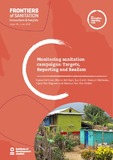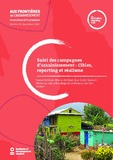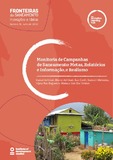Monitoring Sanitation Campaigns: Targets, Reporting and Realism
Suivi des campagnes d’assainissement : Cibles, reporting et réalisme;
Monitoria de Campanhas de Saneamento: Metas, Relatórios e Informação, e Realismo
| dc.contributor.author | Adhikari, Kamal | |
| dc.contributor.author | Adhikari, Bharat | |
| dc.contributor.author | Cavill, Sue | |
| dc.contributor.author | Mehrotra, Santosh | |
| dc.contributor.author | Rao Bejjanki, Vijeta | |
| dc.contributor.author | Van Der Velden, Matteus | |
| dc.coverage.spatial | Nepal | en |
| dc.coverage.spatial | India | en |
| dc.date.accessioned | 2021-06-28T12:23:56Z | |
| dc.date.available | 2021-06-28T12:23:56Z | |
| dc.date.issued | 2021-06 | |
| dc.identifier.citation | Adhikari, K.;Adhikari, B.; Cavill, S.; Mehrotra, S.; Rao Bejjanki, V. and Van Der Velden, M. (2021) ‘Monitoring Sanitation Campaigns: Targets, Reporting and Realism’ Frontiers of Sanitation: Innovations and Insights 18, Brighton: IDS, DOI: 10.19088/SLH.2021.009 | en |
| dc.identifier.citation | Adhikari, K, Adhikari, B. Cavill, S. Mehrotra, S. Rao Bejjanki, V. et Van Der Velden, M. (2021) « Suivi des campagnes d’assainissement : Cibles, reporting et réalisme », Aux Frontières de l’assainissement : Innovations et Impressions 18, Brighton IDS DOI : 10.19088/SLH.2021.023 | fr |
| dc.identifier.citation | Adhikari, K, Adhikari, B. Cavill, S. Mehrotra, S. Rao Bejjanki, V. e Van Der Velden, M. (2021) “Monitoria de Campanhas de Saneamento: Metas, Relatórios e Informação, e Realismo”, 18, Brighton, IDS, DOI: 10.19088/SLH.2022.008 | pt |
| dc.identifier.isbn | 978-1-78118-806-4 | |
| dc.identifier.isbn | 978-1-80470-006-8 | |
| dc.identifier.uri | https://opendocs.ids.ac.uk/opendocs/handle/20.500.12413/16716 | |
| dc.description | For over ten years, IDS’s Sanitation Learning Hub (SLH, previously the CLTS Knowledge Hub) has been supporting learning and sharing across the international sanitation and hygiene (S&H) sector. The SLH uses innovative participatory approaches to engage with both practitioners, policy-makers and the communities they wish to serve. We believe that achieving safely managed sanitation and hygiene for all by 2030 requires timely, relevant and actionable learning. | en |
| dc.description.abstract | Many governments in Asia and Africa have set ambitious target dates for their countries becoming open defecation free (ODF). Some have recently concluded national sanitation campaigns; a number of countries have campaigns underway; while others are in the conceptualising and planning process. Monitoring and reporting results is one of the key challenges associated with these campaigns. This Frontiers of Sanitation presents lessons learnt to date to inform ongoing and future government campaigns intended to end open defecation and improve access to safely managed sanitation. Firstly, we discuss campaigns, targets, monitoring, reporting, and verification arrangements, showing how these processes can be used to increase the credibility of national declarations and strengthen campaigns to respond to challenges. Secondly, we present case studies from India and Nepal, providing campaign-specific details from two recently declared ODF countries. | en |
| dc.description.abstract | Beaucoup de gouvernements d’Asie et d’Afrique ont fixé des dates butoirs ambitieuses pour que leurs pays obtiennent le statut de fin de défécation à l’air libre (FDAL). Certains ont récemment achevé des campagnes nationales d’assainissement ; plusieurs d’entre eux ont des campagnes en cours et d’autres sont actuellement en plein processus de conceptualisation et de planification. L’un des principaux défis associés à ces campagnes consiste à suivre et rapporter les résultats. Ce numéro d’Aux Frontières de l’assainissement présente les leçons apprises à ce jour pour informer les campagnes gouvernementales en cours et futures en vue de mettre fin à la défécation à l’air libre et d’améliorer l’accès à un assainissement géré de manière sûre. Tout d’abord, nous discutons des campagnes, des cibles, du suivi, du reporting et des modalités de vérification pour montrer comment ces processus peuvent être utilisés pour accroître la crédibilité des déclarations nationales et renforcer les campagnes afin de relever différents défis. Ensuite, nous présentons des études de cas de l’Inde et du Népal, en donnant des détails précis sur les campagnes de ces deux pays qui ont récemment été déclarés FDAL. | fr |
| dc.description.abstract | Muitos governos da Ásia e de África definiram prazos ambiciosos para os seus países se tornarem livres de fecalismo a céu aberto (ODF). Alguns concluíram recentemente campanhas nacionais de saneamento; vários países têm campanhas em curso; enquanto outros estão no processo de conceptualização e planificação. Monitorar resultados e dar conta deles é um dos principais desafios que se colocam a essas campanhas. Este número de Fronteiras do Saneamento apresenta as lições aprendidas até agora para que estas possam ser usadas nas campanhas governamentais em curso e a realizar que visem acabar com o fecalismo a céu aberto e melhorar o acesso ao saneamento gerido com segurança. | pt |
| dc.description.sponsorship | Sida | en |
| dc.language.iso | en | en |
| dc.publisher | Institute of Development Studies | en |
| dc.relation.ispartofseries | Frontiers of Sanitation: Innovations and Insights;18 | |
| dc.rights | Attribution: You must attribute the work in the manner specified by the author or licensor. Non-commercial: You may not use this work for commercial purposes. No Derivative Works: You may not alter, transfer, or build on this work. Users are welcome to copy, distribute, display, translate or perform this work without written permission. For any reuse or distribution, you must make clear to others the licence terms of this work. If you use the work, we ask that you reference the SLH website and send a copy of the work or a link to its use online to the following address: The Sanitation Learning Hub, Institute of Development Studies, University of Sussex, Brighton, BN1 9RE, UK (SLH@ ids.ac.uk). | en |
| dc.rights.uri | http://creativecommons.org/licenses/by-nc-nd/3.0/ | en |
| dc.subject | Rural Development | en |
| dc.title | Monitoring Sanitation Campaigns: Targets, Reporting and Realism | en |
| dc.title | Suivi des campagnes d’assainissement : Cibles, reporting et réalisme | fr |
| dc.title | Monitoria de Campanhas de Saneamento: Metas, Relatórios e Informação, e Realismo | pt |
| dc.type | Series paper (non-IDS) | en |
| dc.rights.holder | Institute of Development Studies | en |
| dc.identifier.team | Participation | en |
| dc.identifier.doi | 10.19088/SLH.2021.009 | |
| dc.identifier.doi | 10.19088/SLH.2021.023 | |
| dc.identifier.doi | 10.19088/SLH.2022.008 | |
| dcterms.dateAccepted | 2021-06-28 | |
| rioxxterms.funder | Default funder | en |
| rioxxterms.identifier.project | The Sanitation Learning Hub | en |
| rioxxterms.version | VoR | en |
| rioxxterms.versionofrecord | 10.19088/SLH.2021.009 | en |
| rioxxterms.funder.project | 5e50f69d-6102-4a66-b12d-49ceb02612b0 | en |
Files in this item
This item appears in the following Collection(s)
Except where otherwise noted, this item's license is described as Attribution: You must attribute the work in the manner specified by the author or licensor. Non-commercial: You may not use this work for commercial purposes. No Derivative Works: You may not alter, transfer, or build on this work. Users are welcome to copy, distribute, display, translate or perform this work without written permission. For any reuse or distribution, you must make clear to others the licence terms of this work. If you use the work, we ask that you reference the SLH website and send a copy of the work or a link to its use online to the following address: The Sanitation Learning Hub, Institute of Development Studies, University of Sussex, Brighton, BN1 9RE, UK (SLH@ ids.ac.uk).




